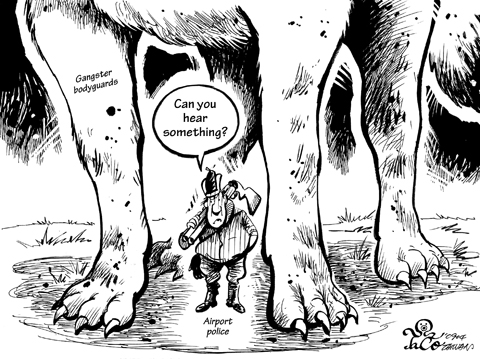Agency
under fire over China status
WEB WRANGLE: DPP lawmakers
protested at the RDEC's offices after a posting on its Web site said going to
the 'mainland area' was not tantamount to 'going abroad'
By Shih Hsiu-chuan
STAFF REPORTER
Saturday, Apr 11, 2009, Page 1
A recent announcement by the Research, Development and Evaluation Commission (RDEC)
that trips made by civil servants to China do not constitute overseas travel
drew fire from lawmakers across party lines yesterday.
“[RDEC] Minister Jiang Yi-huah [江宜樺] has to resign over an announcement that
sells out Taiwan,” Democratic Progressive Party (DPP) Legislator Lee Chun-yee
(李俊毅) said as a group of DPP lawmakers lodged a protest at the RDEC offices
yesterday.
The protest was prompted by a Liberty Times (the Taipei Times’ sister newspaper)
report yesterday that said on April 1 the commission posted an announcement on
the government’s intranet informing government agencies that “given that going
to the ‘mainland area’ is not tantamount to ‘going abroad,’” civil servants are
no longer required to register on the commission’s Web site. Local government
chiefs, however, would still have to submit reports should they visit China, it
added.
Jiang did not meet with the DPP lawmakers yesterday.
“We will come back anytime and find you ... unless you [Jiang] plan to hide from
us for the rest of your life,” Lee said.
The DPP lawmakers shouted slogans such as “Jiang Yi-huah, step down” and “Taiwan
is our country,” before leaving the RDEC offices.
DPP Legislator Hsueh Ling (薛凌) slammed the announcement as an attempt to obscure
civil servants’ sense of national identity and as “a precursor to eventual
unification [with China].”
Chinese Nationalist Party (KMT) caucus secretary-general Yang Chiung-ying (楊瓊瓔)
also urged the commission not to “mistake a foreign country as our country”
because “the Republic of China is an independent sovereign state.”
“In accordance with the legislature’s budget review and the the Act Governing
the Relations between People of the Taiwan Area and the Mainland Area
(兩岸人民關係條例), trips to China are still considered trips abroad,” she said.
In response, RDEC Deputy Minister Yeh Kuang-shih (葉匡時) said yesterday that the
announcement was only posted on the intranet because its technicians were
testing a new system for civil servants to use when uploading reports on trips
to China, as opposed to the existing one for civil servants for uploading
reports on other overseas travel.
We find it regrettable that the announcement, not a finalized one, was distorted
by the media, who quoted a phrase or two out of context on purpose to make it
into a unification-independence issue,” Yeh said.
In view of increasing cross-strait exchanges involving civil servants, Yeh said
the commission was planning to separate reporting by civil servants for their
trips to China and to other countries on two separate systems.
The RDEC considered it necessary not to make public the contents of some of the
reports on civil servants’ trips to China, Yeh said.
“It is still in the review stage,” he said.
Regulations state that when civil servants take an overseas trip, they are
required to complete a report when they return and the reports are then made
public online.
Regulations on government cross-strait activities state that civil servants are
required to submit their itineraries and travel details to their superiors and
the Mainland Affairs Council (MAC), but are not required to upload the
information online.
Commenting on the controversy, MAC Deputy Minister Liu Te-shun (劉德勳) said
yesterday that the phrasing in the announcement that “going to the ‘mainland
area’ is not tantamount to ‘going abroad’” should not be blown up into a big
issue because “cross-strait relations are a special case.”
Liu said that was the reason why a law called the Act Governing Relations
Between People of the Taiwan Area and the Mainland Area was originally passed.
|
|
| INDEPENDENT
THINKING Members of the Alliance of Referendum for Taiwan gather outside the American Institute in Taiwan in Taipei yesterday to state their case for Taiwanese independence. PHOTO: CHU PEI-HSIUNG, TAIPEI TIMES |
Lu refuses
to rule out visit to China
By Mo Yan-chih
STAFF REPORTER
Saturday, Apr 11, 2009, Page 4
|
|
| Former vice
president Annette Lu speaks at a press conference at her office
yesterday to announce the launch of her new weekly paper Formosa Weekly. PHOTO: LO PEI-DER, TAIPEI TIMES |
Former vice president Annette Lu (呂秀蓮) said yesterday she would not rule out
visiting China as the founder of Formosa Weekly (玉山週報).
While introducing the newspaper’s trial issue yesterday, Lu condemned President
Ma Ying-jeou’s (馬英九) administration for embracing the concept of “one China”
despite the military threat from Beijing.
Lu had planned to print a daily newspaper, the Formosa Post (玉山午報), but changed
it to a weekly paper because of funding problems. An online version of the
weekly paper and the Formosa Post will be launched in the future, she told a
press conference at her office.
When asked to comment on whether she would visit China in her new role as a
newspaper publisher, Lu said she would discuss the matter with the Democratic
Progressive Party (DPP) and make sure any such visit would not damage Taiwan’s
dignity.
“I am not against [visiting China], but there’s no timetable. I don’t have to
go,” she said.
Lu sparked debate within the DPP over her apparent willingness to visit China
with some party members strongly opposed to any trip.
Lu said that she and her staff do not hold any positions in the DPP and she had
founded the newspaper as an ordinary citizen.
The trial issue, which hit the newsstands yesterday, covered the problems the
DPP faces as an opposition party and the Ma administration’s efforts to develop
nuclear power plants.
The next trial issue will be available on May 20, and the official launch of the
Formosa Post is scheduled for July 1, the former vice president said.
